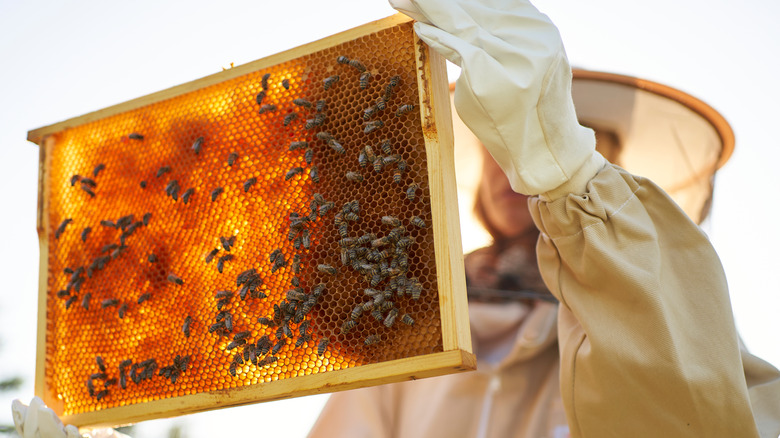Is Lab-Made Honey The Buzzy Solution To The Bee Problem?
While the honey bear is an iconic modern day image, the history of the sweet golden nectar stretches much farther back, well before marketers combined honey and beast. There are records of honey as far back as there are human records, and many cultures around the world, including the ancient Egyptians and ancient Romans, have used honey as food, medicine, and even offerings to their respective gods, with the Romans greatly expanding beekeeping practices (via The Honey Association).
In modern times, honey is still incredibly common in the average pantry. There's around a billion honey bees spread among millions of colonies in Canada and the United States alone, per Scientific American. But the proliferation of honey bees has paradoxically done a number on the native bee populations in North America. Honey bees as we know them were imported from Europe and their unnatural colonies make them compete with the native, wild bee population to negative environmental effects in locations scarce with plant life (via NPR). But there could be a solution to this bee problem on the horizon, thanks to food science.
A serving of honey, hold the bees
Advancements in food science don't just help us understand what we're eating; they also allow us to create new foods. The company MeliBio is making full use of the science at their disposal to create honey without bees in their lab. Melibio's process for making the vegan honey involves taking naturally occurring glucose and fructose from fruits and vegetables, then mixing them with elements from plants honey bees would pollinate in nature, like hibiscus or clover (via Bon Appétit).
MeliBio isn't alone in trying to make synthetic honey, either. The Israel-based company Bee-Io is also attempting to make vegan honey as an alternative to the current beekeeping system, though the details of their patent-pending processes are undisclosed (via Bee-Io). That said, vegan honey might not solve all the bee problems; Alison McAfee, author of the Scientific American article titled "The Problem With Honey Bees," told Bon Appétit, "we need honey bees to pollinate our crops," adding that wild bees still "have to fend for themselves against ... diseases, pesticides, or extreme weather." At the very least, the advancements in food science that have led to the creation of vegan honey promises an alternative avenue to the current systems.

